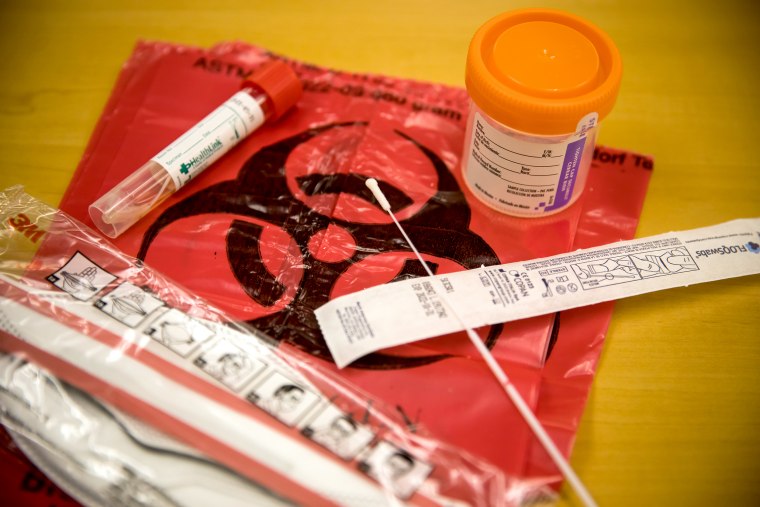This article will be updated regularly.
The coronavirus pandemic has sparked a rush for private companies to offer ways for people to test themselves for the virus from their own homes.
But there's a lot of empty claims, hype and scams that consumers need to beware of — as well as crucial information that will help understand them how and why to avoid these fake tests.
The most important thing to know is that the FDA has not yet approved any at-home diagnostic tests for the coronavirus. There are also no at-home antibody tests currently approved by the FDA.
The FDA has approved one at-home collection kit, made by LabCorp.
Here’s a look at how tests work, and what you need to know about them.
How do coronavirus tests work?
Most U.S. coronavirus tests require a swab taken from the back of the nasal cavity or the throat, which is then tested for the presence of the virus’s RNA. A positive result means that person is currently infected with the virus.
These tests are done by public health labs as well as major commercial labs that can conduct large-scale testing.
Saliva can also be used to test for coronavirus, though only one test thus far — from Rutgers University — has received an FDA emergency approval. There is no at-home version of the test. In its authorization letter to Rutgers, the FDA said the test should only be performed “in a health care setting under the supervision of a trained health care provider.”
A different kind of test determines whether someone has previously been infected with the coronavirus. Called serological tests, these look for blood antibodies — proteins produced by the immune system’s response to the virus.
Some companies are pushing at-home sample collection, in which people swab themselves and then send their sample in to get tested in a lab. This method can work, but can be prone to error because samples can easily be collected incorrectly or tainted during shipping.
What about at-home test kits?
Many companies have touted that they are working on at-home kits, but they should be viewed with scrutiny, particularly since none have been approved by the FDA yet.
Full coverage of the coronavirus outbreak
Some companies have worked to create kits that allow people to swab themselves at home and then mail their sample to a lab that can process their test. This type of kit is an at-home collection kit, not an at-home diagnostic test.
The FDA has issued emergency use approval for one such test from LabCorp.
What about antibody tests?
Serological tests use small amounts of blood, usually from a finger prick, to test whether a person was previously infected with the coronavirus by looking for antibodies.
Antibodies are created by the human immune system to fight off foreign invaders, like the coronavirus. A positive result does not mean a person is currently infected; it can only tell whether someone was infected in the past.
And because it takes the body several days after being infected to develop antibodies, a test given too early could come back negative, even if someone has the virus.
Download the NBC News app for full coverage of the coronavirus outbreak
Antibody tests are still in development, though some companies have made outlandish claims. The FDA said in a recent statement that more than 70 test developers have told the agency they have serological tests available, but warned that many of these developers are falsely claiming their products have FDA approval or authorization.
Currently only four companies have an FDA-approved serological test for coronavirus, though they are not for at-home testing.
Antibody tests could become increasingly important as localities try to figure out just how much of its population has already been infected — and how many could still be susceptible to the virus.
How does the FDA fit in here?
The FDA is the governmental body that oversees testing, which falls under its edict of regulating medical devices.
FDA approval for new tests can take months and even years, Wroblewski said.
But in emergency situations, such as the coronavirus pandemic, the FDA can issue "emergency use authorizations," in which the process is sped up.
What about claims of FDA approval?
The FDA has issued more than 52 approvals for tests for the detection of the virus and one approval for an antibody test as of April 21. Most of these approvals have been given to major testing companies and university labs. These are labs where collected samples can be properly tested.
None of those companies have been approved for at-home diagnostic testing, and only one — the LabCorp kit — has received approval for at-home sample collection.


